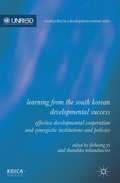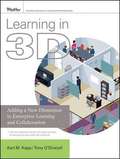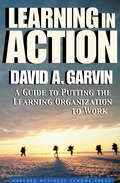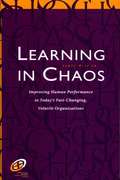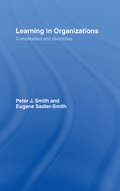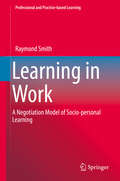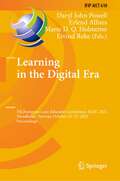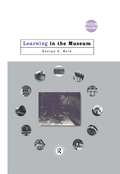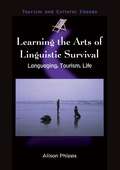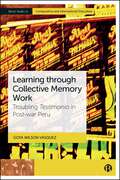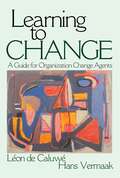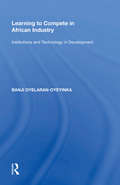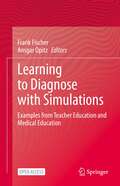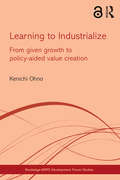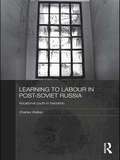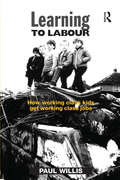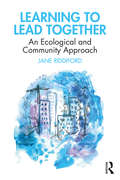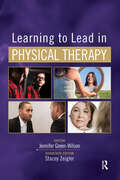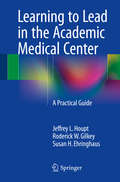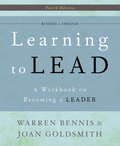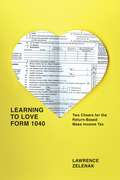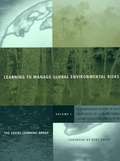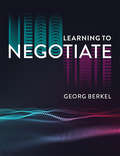- Table View
- List View
Learning from the South Korean Developmental Success
by Ilcheong Yi Thandika MkandawireThis analysis of South Korea's development experience can present lessons for development in the 21st century. Situating the development experience of South Korea within the framework of the capability enhancing state, this volume examines the empowering institutions and policies of South Korea between 1945 and 2000.
Learning in 3D
by Tony O'Driscoll Karl M. KappThis book offers an ideal resource for those responsible for teaching the next generation of learning on the Internet. It describes how learning needs to be adapted to 3D environments and includes the tools learning and development professionals will need in order to advance 3D learning within their organizations. The author also describes how the merger of learning and work will shape future 3D environments. As 3D worlds allow workers to create and collaborate, soon those virtual creations can have serious impact on physical production of goods.
Learning in Action
by David A. GarvinMost managers today understand the value of building a learning organization. Their goal is to leverage knowledge and make it a key corporate asset, yet they remain uncertain about how best to get started. What they lack are guidelines and tools that transform abstract theory-the learning organization as an ideal-into hands-on implementation. For the first time in Learning in Action, David Garvin helps managers make the leap from theory to proven practice. Garvin argues that at the heart of organizational learning lies a set of processes that can be designed, deployed, and led. He starts by describing the basic steps in every learning process-acquiring, interpreting, and applying knowledge-then examines the critical challenges facing managers at each of these stages and the various ways the challenges can be met. Drawing on decades of scholarship and a wealth of examples from a wide range of fields, Garvin next introduces three modes of learning-intelligence gathering, experience, and experimentation-and shows how each mode is most effectively deployed. These approaches are brought to life in complete, richly detailed case studies of learning in action at organizations such as Xerox, L. L. Bean, the U. S. Army, and GE. The book concludes with a discussion of the leadership role that senior executives must play to make learning a day-to-day reality in their organizations.
Learning in Action: A Guide to Putting the Learning Organization to Work
by David A. GarvinMost managers today understand the value of building a learning organization. Their goal is to leverage knowledge and make it a key corporate asset, yet they remain uncertain about how best to get started. What they lack are guidelines and tools that transform abstract theory-the learning organization as an ideal-into hands-on implementation. For the first time inLearning in Action, David Garvin helps managers make the leap from theory to proven practice. Garvin argues that at the heart of organizational learning lies a set of processes that can be designed, deployed, and led. He starts by describing the basic steps in every learning process-acquiring, interpreting, and applying knowledge-then examines the critical challenges facing managers at each of these stages and the various ways the challenges can be met. Drawing on decades of scholarship and a wealthof examples from a wide range of fields, Garvin next introduces three modes of learning-intelligence gathering, experience, and experimentation-and shows how each mode is most effectively deployed. These approaches are brought to life in complete, richly detailed case studies of learning in action at organizations such as Xerox, L. L. Bean, the U. S. Army, and GE. The book concludes with a discussion of the leadership role that senior executives must play to make learning a day-to-dayreality in their organizations.
Learning in Chaos
by James Hite. Jr.This book explains how change is a functional characteristic of any organization. And, as organizations begin to understand the nature of change, they can still adapt and grow by incorporating change into their structure instead of trying to control it. To help you understand and grow in this ever-changing environment, this book covers four principal areas of thought on change.Chaos, including chaos theory Organizational theory and practice Learning theory and practice The general social environment Executives, managers, and other organizational leaders will find this book invaluable as they refocus the direction of their organizations in order to realize the benefits of learning under changed environmental circumstances.
Learning in Organizations: Complexities and Diversities
by Eugene Sadler-Smith Peter J SmithTaking a fresh and innovative approach to the complexities and challenges inherent in organizational learning diversity, the authors show that there are no generic solutions. They argue there is no 'best way' of planning, organizing and implementing learning in relation to the workplace and instead provide context-specific solutions to the dilemmas and issues that diversities present. With an international approach, grounded in theory and incorporating strong practical examples, this book is essential reading for all those studying, teaching or practising human resource development, human resource management or professional education.
Learning in Work: A Negotiation Model Of Socio-personal Learning (Professional and Practice-based Learning #23)
by Raymond SmithThis book explores and progresses the concept of negotiation as a means of describing and explaining individuals’ learning in work. It challenges the undertheorised and generic use of the concept in contemporary work-learning research where the concept of negotiation is most often deployed as a taken for granted synonym for interaction, co-participation and collaboration and, hence, used to unproblematically account for workers’ learning as engagement in social activity. Through a focus on workers’ personal practice and based on extensive longitudinal empirical research, the book advances a conceptual framework, The Three Dimensions of Negotiation, to propose a more rigorous and work-learning specific understanding of the concept of negotiation. This framework enables workers’ personal work practices and their contributions to the personal, organisational and occupational changes that evidence learning to be viewed as negotiations enacted and managed, within contexts that are in turn sets of premediate and concurrent negotiations that frame the transformations on and from which on-going negotiations of learning and practice ensue. The book does not seek to supplant understandings of the rich and valuable concept of negotiation. Rather, it seeks to develop and promote a more explicit use of the concept as a socio-personal learning concept at the same time as it opens alternative perspectives on its deployment as a metaphor for individual’s learning in work.
Learning in the Digital Era: 7th European Lean Educator Conference, ELEC 2021, Trondheim, Norway, October 25–27, 2021, Proceedings (IFIP Advances in Information and Communication Technology #610)
by Erlend Alfnes Daryl John Powell Marte D. Q. Holmemo Eivind RekeThis book constitutes the refereed proceedings of the 7th European Lean Educator Conference ELEC 2021, hosted in Trondheim, Norway, in October 2021 and sponsored by IFIP WG 5.7. The conference was held virtually. The 42 full papers presented were carefully reviewed and selected from 82 submissions. They are organized in the following thematic sections: Learning Lean; Teaching Lean in the Digital Era; Lean and Digital; Lean 4.0; Lean Management; Lean Coaching and Mentoring; Skills and Knowledge Management; Productivity and Performance Improvement; New Perspectives of Lean.
Learning in the Museum (Museum Meanings)
by George E. HeinLearning in the Museum examines major issues and shows how research in visitor studies and the philosophy of education can be applied to facilitate a meaningful educational experience in museums. Hein combines a brief history of education in public museums, with a rigorous examination of how the educational theories of Dewey, Piaget, Vygotsky and subsequent theorists relate to learning in the museum. Surveying a wide range of research methods employed in visitor studies is illustrated with examples taken from museums around the world, Hein explores how visitors can best learn from exhibitions which are physically, socially, and intellectually accessible to every single visitor. He shows how museums can adapt to create this kind of environment, to provide what he calls the 'constructivist museum'. Providing essential theoretical analysis for students, this volume also serves as a practical guide for all museum professionals on how to adapt their museums to maximize the educational experience of every visitor.
Learning the Arts of Linguistic Survival
by Alison PhippsIn this ground-breaking contribution to the study of tourism and languages, Alison Phipps examines what happens when tourists learn to speak other languages. From ordering a coffee to following directions she argues for a new perception of the relationship between tourism and languages from one based on the acquisition of basic, functional skills to one which sustains and even strengthens intercultural dialogue. The twelve chapters comprising this book tell stories of the experience of learning and speaking tourist languages. Drawing on a range of disciplines Alison Phipps takes the reader on a journey through risk, way finding, mistakes, laughter, conversations and the imagination. She provides rich descriptions of the world of language learning which has remained invisible to mainstream studies of language education, existing as it does on the margins of educational life. She shows how tourism is shaped by the learning experiences of everyday life. Languages, she argues passionately, fundamentally change the nature of perception, dwelling and relationships to other people and the world. This book will be essential reading for all those interested in tourism studies and in modern languages education. It is a timely study, coming at time of crisis in languages, as English exerts its power as a world language and as a dominant language of tourism. Learning the Arts of Linguistic Survival: Languaging, Tourism, Life will also be of interest to anthropologists, linguists, geographers, sociologists and those studying education.
Learning through Collective Memory Work: Troubling Testimonio in Post-war Peru (Bristol Studies in Comparative and International Education)
by Goya Wilson VásquezThis book traces the process of producing testimonio with the children of the Tupac Amaru Revolutionary Movement (MRTA), an insurgent group during Peru’s internal war (1980–2000). It examines how the group navigates post-war struggles over memory while dealing with the ‘children of terrorists’ stigma. Drawing from a cycles of inquiry approach, the book theorizes three movements for memory work: a realist presentation of testimonial narratives, a ‘politics of memory’ engaging with the conditions of production and a ‘poetics of memory’ that troubles memory, voice and representation for qualitative inquiry in post-war contexts. Challenging the notion of war-torn countries as pure devastation, the author invites readers to see them as sites of knowledge and creativity, with much to offer for education, peace studies and social justice research.
Learning to Change: A Guide for Organization Change Agents
by Léon de Caluwe J. "Hans" Vermaak"A good balance between theory and practice . . . it definitely fills a void in the [lack of] texts in the area and the change literature in general . . . a good fit for my graduate class on ′Managing Organizational Change.′" —Anthony F. Buono, McCallum Graduate School of Business, Bentley College "Like Gareth Morgan′s Images of Organization, this book is a superb blend of theory and practicality. It demystifies chaos and paradox, and it encourages the understanding of organizational dynamics from multiple perspectives. It is refreshing to read a book that presents diverse theories and interventions so even-handedly." —Andrea Markowitz, Ph.D., President, OB&D, Inc. Learning to Change: A Guide for Organizational Change Agents provides a comprehensive overview of organizational change theories and practices developed by both U.S. and European change theorists. The authors compare and contrast five fundamentally different ways of thinking about change: yellow print thinking, blue print thinking, red print thinking, green print thinking and white print thinking. They also discuss in detail the steps change agents take, such as diagnosis, change strategy, the intervention plan, and interventions. In addition, they explore the attributes of a successful change agent and provide advice for career and professional development. The book includes case studies that describe multiple approaches to organizational change issues. This book will appeal to both the practitioner and academic audiences. It can be used as a text in graduate courses in change management and will also be a useful reference for consultants and managers. Features: Discusses the abilities, attitudes, and styles of successful change agents Describes five fundamentally different ways of thinking about change Presents a state-of-the-art overview of change management insights, methods, and instruments Summarizes an extensive amount of organizational change literature Supplies readers with useful insights and courses of action that will allow them to design and implement change professionally Learning to Change became a bestseller upon its initial publication in the Netherlands. The color-model on change is very popular among thousands of managers and change consultants and presents a new approach to change processes and a new language for change.
Learning to Compete in African Industry: Institutions and Technology in Development
by Banji Oyelaran-OyeyinkaThis book examines the institutional roots of the persistent differences in economic performance of firms, industries and countries in Africa. It draws attention to the role of institutions in supporting technical change and shows how technological progress is central to competitiveness in a global context. The role of initial conditions such as levels of literacy and natural endowment, the structure of industry and resource endowment are also emphasized. With its focus on how institutions shape systems of innovation this book makes a unique contribution to the debate about African development.
Learning to Diagnose with Simulations: Examples from Teacher Education and Medical Education
by Frank Fischer Ansgar OpitzThis open access book presents 8 novel approaches to measure and improve diagnostic competences with simulation. The book compares the effects of interventions on these diagnostic competences in both teacher and medical education. It includes analyses showing that important aspects of diagnostic competences and effects of instructional interventions aiming to facilitate them are comparable for teachers and doctors. Through closely analyzing projects from medical education, mathematics education, biology education, and psychology, the reader is presented with multiple options for interventions that may be used in each of the subject areas and the improvements in diagnostic skills that could be expected from each simulation. The book concludes with an outline of promising future research on the use of simulations to facilitate professional competences in higher education in general, and for the advancement of diagnostic competencies in particular.This is an open access book.
Learning to Forget: Competing for the Future
by Gary Hamel C. K. PrahaladThe deeply encoded lessons of the past that are passed from one generation of managers to another produce a dangerous reliance on precedent. This chapter discusses the need for organizations to shed the managerial frames that have structured organizational life and rebuild with an eye toward the future.
Learning to Industrialize: From Given Growth to Policy-aided Value Creation (Routledge-GRIPS Development Forum Studies)
by Kenichi OhnoThis book proposes a new, pragmatic way of approaching economic development which features policy learning based on a comparison of international best policy practices. While the important role of government in promoting private sector development is being recognized, policy discussion often remains general without details as to what exactly to do and how to avoid common pitfalls. This book fills the gap by showing concrete policy contents, procedures, and organizations adopted in high-performing East Asian economies. Natural resources and foreign aid and investment can take a country to a certain income level, but growth stalls when given advantages are exhausted. Economies will be caught in middle income traps if growth impetus is not internally generated. Meanwhile, countries that have soared to high income introduced mindset, policies, and institutions that encouraged, or even forced, accumulation of human capital – skills, technology, and knowledge. How this can be done systematically is the main topic of policy learning. However, government should not randomly adopt what Singapore or Taiwan did in the past. A continued march to prosperity is possible only when policy makers acquire capability to formulate policy suitable for local context after studying a number of international experiences. Developing countries wanting to adopt effective industrial strategies but not knowing where to start will benefit greatly by the ideas and hands-on examples presented by the author. Students of development economics will find a new methodological perspective which can supplement the ongoing industrial policy debate. The book also gives an excellent account of national pride and pragmatism exhibited by officials in East Asia who produced remarkable economic growth, as well as serious effort by an African country to emulate this miracle.
Learning to Labour in Post-Soviet Russia: Vocational youth in transition (BASEES/Routledge Series on Russian and East European Studies)
by Charles WalkerThis book explores the changing nature of growing-up working-class in post-Soviet Russia, a country dislocated by the experience of neo-liberal economic reform. Based on extensive ethnographic research in a provincial Russian region, it follows the experiences of vocational education graduates whose colleges continue to channel them into the ailing industrial and agricultural sectors. Rather than settling for transitions into ‘poor work’, the book shows how these young men and women develop a range of strategies aimed at overcoming the poverty of opportunity available to them in traditional enterprises, pursuing instead emerging opportunities in higher education, jobs in the new service sector and the prospect of migration. Drawing on a range of theoretical perspectives, Charles Walker analyses these strategies and their significance for wider processes of social change and social stratification in post-Soviet Russia.
Learning to Labour: How Working Class Kids Get Working Class Jobs
by Paul WillisThis book which has now established itself as a classic study of working class boys describes how Paul Willis followed a group of 'lads' as they passed through the last two years of school and into work. The book explains that for 'the lads' it is their own culture which blocks teaching and prevents the realisation of liberal education aims. This culture exposes some of the contradictions within these formal aims and actually supplies the operational criteria by which a future in wage labour is judged. Paul Willis explores how their own culture can guide working class lads on to the shop floor. This is an uncompromising book which has provoked considerable discussion and controversy in educational circles throughout the world - it has been translated into Finnish, German, French, Swedish, Japanese and Spanish.
Learning to Lead Together: An Ecological and Community Approach
by Jane RiddifordNever before has there been such strong recognition of the importance of community-based green spaces to local communities and urban redevelopment. This book is an autoethnographic account of the challenges and breakthroughs of learning to lead together. The interwoven stories provide first-hand, evocative examples of how an ecological and community approach to organisational development and urban regeneration helped shift the business as usual paradigm. It will help you identify and step beyond individualistic and ‘heroic’ notions of leadership, and will inspire you to find your own way of embracing natural and shared authority. The book focuses on the experiences of developing an environmental education charity in London; Global Generation. It shows how action research, nature practice and storytelling has successfully grown shared purpose, trust and collaboration, both within Global Generation and in the wider community. The style and structure of the book reflects the participatory approach that it presents. The author, Jane Riddiford, deliberately challenges the norms of authorship, which is shaped by the dominant Western narrative – objective, authorless and ‘othered’. This book goes beyond this narrow framework, combining different styles of writing, including traditional and autobiographical storytelling, diary entries and co-writing. Along with practice accounts of what happened, challenges raised and lessons learned, each chapter will also include other people’s descriptions of their experience of being involved in the process.
Learning to Lead in Physical Therapy
by Jennifer Green-Wilson Stacey ZeiglerA timely and essential book for physical therapist and physical therapist assistant students, faculty, and practitioners, as well as clinical educators, Learning to Lead in Physical Therapy provides information on identifying, developing, and demonstrating effective leadership skills for daily practice.Drs. Jennifer Green-Wilson and Stacey Zeigler explain that in a health care field that’s constantly evolving, leadership skill development must be a high priority in physical therapy education and practice. Leadership skills are critical for physical therapists and physical therapist assistants throughout the course of their careers—in an informal leadership role with patients, in collaboration and advocacy for interdisciplinary care, and in formal leadership positions as they continually adapt to new expectations.With an evidence-based framework, the authors incorporate a workbook-style text with written prompts, activities, tools, quotes, and personal vignettes from practicing clinicians to explore concepts including: Discovering your individual strengths, developing your leadership style, and learning to lead through mentorship and coaching Communicating effectively, incorporating teamwork and collaboration, becoming an inclusive leader, and leading through conflict Effecting change through leadership, ethical decision-making, and serving others This book is easily incorporated within a single course or across multiple courses throughout a curriculum. Academic and clinical faculty and practitioners will also find this book easy to use for personal growth with its activity-based guidance through each chapter.Included with the text are online supplemental materials for faculty use in the classroom.Physical therapists and physical therapist assistants have the unique opportunity to be leaders at all levels—in their practices, the health care system, and their communities at large. Learning to Lead in Physical Therapy is an essential text in preparing students, faculty, and practitioners of all levels for these crucial leadership roles and responsibilities.
Learning to Lead in the Academic Medical Center
by Jeffrey L. Houpt Roderick W Gilkey Susan H. EhringhausThis compelling title is a comprehensive, practical guide for current and aspiring leaders in academic medical centers (AMC). Offering both a broad overview of the dynamics of the AMC and a detailed "how-to" set of instructions for the wide-ranging situations that demand skilled leadership, this expertly designed volume is filled with meaningful examples and insights. Learning to Lead in the Academic Medical Center: A Practical Guide consists of five parts. The first three sections are narrative and intended to help the reader become a better leader. The first section looks at the AMC as a social system and emphasizes an understanding of group dynamics. The second section discusses the critical role of personality, while the third covers all the necessary leadership skill sets such as negotiation, persuasion, conflict resolution, running a meeting, and so on. The fourth section is a fascinating series of case vignettes to solve based on the material that preceded it. The final section provides a set of highly instructional solutions to those cases. An indispensable reference authored by three highly accomplished leaders in the field, Learning to Lead in the Academic Medical Center: A Practical Guide will be of great interest to all physicians and trainees who seek a comprehensive yet handy resource on the need-to-know basics of success in the AMC environment.
Learning to Lead: A Workbook on Becoming a Leader
by Warren Bennis Joan GoldsmithOver his distinguished career Warren Bennis has shown that leaders are made, not born. In Learning to Lead, written in partnership with management development expert Joan Goldsmith, Bennis provides a program that will help managers transform themselves into leaders.Using wise insights from the world's best leaders, helpful self-assessments, and dozens of one-day skill-building exercises, Bennis and Goldsmith show in Learning to Lead how to see beyond leadership myths and communicate vision to others. With updates throughout, Learning to Lead is both a workbook and a deeply considered treatise on the nature of leadership by two of its finest and most experienced practitioners-and teachers.
Learning to Love Form 1040
by Lawrence ZelenakNo one likes paying taxes, much less the process of filing tax returns. For years, would-be reformers have advocated replacing the return-based mass income tax with a flat tax, federal sales tax, or some combination thereof. Congress itself has commissioned studies on the feasibility of a system of exact withholding. But might the much-maligned return-based taxation method serve an important yet overlooked civic purpose? In Learning to Love Form 1040, Lawrence Zelenak argues that filing taxes can strengthen fiscal citizenship by prompting taxpayers to reflect on the contract they have with their government and the value--or perceived lack of value--they receive in exchange for their money. Zelenak traces the mass income tax to its origins as a means for raising revenue during World War II. Even then, debates raged over the merits of consumption-based versus income taxation, as well as whether taxes should be withheld from payroll or paid at the time of filing. The result is the income tax system we have today--a system whose maddening complexity, intended to accommodate citizens in widely different circumstances, threatens to outweigh any civic benefits. If sitcoms and political cartoons are any indication, public understanding of the income tax is badly in need of a corrective. Zelenak clears up some of the most common misconceptions and closes with suggestions for how the current system could be substantially simplified to better serve its civic purpose.
Learning to Manage Global Environmental Risks
by Social Learning GroupThis book examines how ideas, interests, and institutions affect management practice; how management capabilities in other areas affect the ability to deal with environmental issues; and how learning affects society's approach to the global environment.
Learning to Negotiate
by Georg BerkelWe negotiate every day, as managers or lawyers, parents, friends, and citizens. Decades of research have generated an abundance of knowledge about how to negotiate but this research also tells us that we still fall far short of our abilities. Much less has been written about how to learn to negotiate. Comprehensively addressing both of these questions, this new textbook combines practitioner guidance with empirical research to teach negotiation as a skill that can be learned and mastered. Leaving behind the typical quick-fix solutions of the rulebook approach to negotiation, Berkel backs up his practical advice with a wealth of examples, case studies, and graphic illustrations. This is an invaluable book for MBA, law and other professional students, as well as executives seeking to develop and improve their skills in negotiation.
